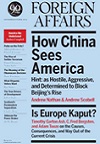Why Drones Fail
Legal justification and transparency of drone strikes have become a concern for the U.S. In reality, are these targeted killings advancing the strategic goals of U.S. counter-terrorism policy?
 Courtesy: Foreign Affairs
Courtesy: Foreign Affairs
Legal justification and transparency of drone strikes have become a concern for the U.S. In reality, are these targeted killings advancing the strategic goals of U.S. counter-terrorism policy?
 Courtesy: Foreign Affairs
Courtesy: Foreign Affairs
A decade ago, the U.S. immersed itself in the greater Middle East with its wars on Afghanistan and Iraq. Will the current economic scenario force it to turn away from this region?
 Courtesy: Foreign Affairs
Courtesy: Foreign Affairs
The fear that a growing India might have to take on responsibilities commensurate with its power has made New Delhi uneasy about the international discourse on India’s rise. How can the West, then, convince India to play a larger international role?
 Courtesy:
Courtesy:
Overall, the U.S.-Pakistan alliance hasn't been pleasant. Despite their growing mutual distrust for each other, which has become evident in the past few years, the alliance still continues. Is it worth all the troubles it comes with?
 Courtesy: Foreign Affairs
Courtesy: Foreign Affairs
The U.S. has continually been trying to coerce Iran into giving up its nuclear program for years now, but with little success. What should Washington do to avoid both military action, and deterrence?
 Courtesy: Foreign Affairs
Courtesy: Foreign Affairs
In the next decade, China will continue to rise, not fade. Its leaders will consolidate the one-party model and, in the process, challenge the West’s smug certainty about political development and the inevitable march toward electoral democracy.
The Obama administration plans to restrain Chinese belligerence by reinforcing U.S. military and diplomatic links to the Asia-Pacific. However, in order to avoid further Chinese resistance to its policies, the U.S. must look for possible avenues of cooperation with the country.
 Courtesy: Foreign Affairs
Courtesy: Foreign Affairs
There’s been much talk about the “the rise of the rest,” with Brazil, Russia, India, and China leading the charge. However, few countries can sustain unusually fast growth for a decade, and even fewer, for more than that. As the boom years begin to end, the international order won’t change as much as expected.
 Courtesy: Anna Frodesiak/WikimediaCommons
Courtesy: Anna Frodesiak/WikimediaCommons
China's legal system is more formalized and better functioning than many realize. Still, given the Chinese Communist Party's lock on judicial power, the country still has work to do.
 Courtesy: Foreign Affairs
Courtesy: Foreign Affairs
Jeffrey D. Sachs argues that the mono-causal analysis of the book, 'Why Nations Fail,’ – that economic development hinges on a country’s political institutions – ignores important factors (such as geography) that can also affect growth.